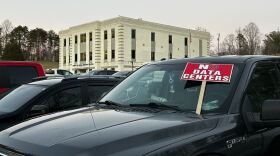The North Carolina Board of Elections has formally launched an effort to collect driver's license or the final four digits of social security numbers for more than 100,000 voters who did not provide the information when they registered.
State elections officials launched what they are calling their "Registration Repair Project" in response to a May lawsuit by the U.S. Department of Justice that alleged the North Carolina Board of Elections' voter registration form led some people to believe they didn't need to provide a driver's license number or the last four digits of their social security number.
That led, the Department of Justice said, to North Carolina maintaining a faulty voter roll, violating the federal Help America Vote Act.
About 103,000 registered voters will need to repair their registrations in order to vote easily in upcoming elections. If they do not provide the necessary information, those people will need to cast provisional ballots.
"No duly registered voter is going to be removed because of this project. We are required by both state and federal law to go back and collect this information. (It's) the fault of a faulty form that was promulgated years ago. It's not the fault of the voters," Sam Hayes, the Board of Elections' executive director, told reporters Thursday.
Hayes went on to say the Board of Elections' Voter Registration Repair project is an effort to settle the Department of Justice lawsuit.
How can voters fix their records?
Voters can visit www.ncsbe.gov/registrationrepair and search their name, address or voter registration number to see if they have missing information.
If they do, the voter can submit updated information through the N.C. Department of Motor Vehicles' website; visit their county Board of Elections office with a license or social security card; or reply to the Board of Elections mailers that are set to be sent in early August.
The Board of Elections mailers will come with pre-addressed return envelopes with paid postage. The state's website should be updated within 10 days.
If someone does not correct their voter registration and shows up to the polls this November, they will be required to vote provisionally. At the same time, poll workers will instruct those voters to provide either their drivers' license number or the last four digits of their social security number.
"It really shouldn't be much of a problem for the voter when they're filling out that form to make sure they have everything they need to have their provisional ballot count," said Paul Cox, the Board of Elections' general counsel.
Hayes added that due to the state's fairly new photo ID requirement to vote, many people will already be bringing their driver's license to polling places.
There is one wrinkle: People with missing information who cast provisional ballots and do not provide the requisite information will have their votes counted in some elections but not in all of them.
Cox said those votes would count in federal elections because those voters are considered registered under the National Voter Registration Act but likely not in state or local contests due to state appellate courts' decisions this spring in Jefferson Griffin's efforts to overturn Allison Riggs' victory in a state Supreme Court race.
When county Boards of Elections meet to review provisional ballots in upcoming elections, they will also consider whether the voter provided adequate identifying information.
House Bill 958, an omnibus elections law that started moving among legislative committees shortly before lawmakers left for a summer break, proposed giving county boards five days after the election instead of three to count ballots. That's in part to give county officials enough time to verify provisional ballots, Hayes said.
"We hope that we will see that legislation pass both chambers. We don't have a timeframe for that," Hayes said Thursday.
Thousands asked to update records
There is another group of about 90,000 people who provided the necessary information at some point but for whom it isn't paired with their active voting record for whatever reason.
The state Board of Elections has been able to work with county boards to examine internal records and determine those voters have complied with the law and they don't need to vote provisionally or correct their record.
"Just because we're sending these mailings out to voters doesn't mean that we're not continuing to do our own internal due diligence and working with the counties to see if we can't uncover information that might be in our possession to satisfy these requirements," Hayes said.
Still, those roughly 90,000 people will receive a different mailer in the coming months as part of an effort to update their registrations to clean up the Board of Elections' records.
Cox said, "They're not going to be subject to provisional voting, but the state board determined that it was a good idea to attempt to update the voter registration rolls so even those voters have updated information in their records."







